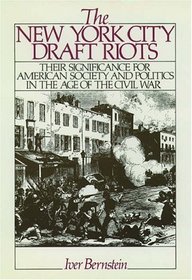This book was a great disappointment. I've always believed that to really understand the Civil War, you need to understand the social, economic and political aspects of life during and before that period. However, I read this book as I wanted to know about the specific events of the New York Draft Riots. The author hardly ever mentions any specific events in the riots. Almost all of the book dealt with social and economic events and political maneuverings in the 1830s-40s-50s and 70s. Occasionally, as I began scanning the pages about half-way through, I would see "1863" listed, but with very little or no details of the riots themselves.
Frankly, I began to think this book was simply an expansion of the writer's Ph.D. dissertation. In addition the author writes poorly. It is not an easy book to read.
Finally, and this really should have told me something, on the first page of the Introduction the author states: "It is fair to speculate...if Confederate General Robert E. Lee had pushed north from Gettysburg at the moment rioting occurred in New York City, European intervention would have stalemated the war."
This makes you wonder what the author was smoking.
Lee's Army of Northern Virginia took over 30% casualties at Gettysburg. Lee's wagon train of wounded stretched for over 16 miles. He was defeated at Gettysburg on July 3rd and finally made it back across the Potomac by July 13th. The New York riots didn't even begin until July 16th. And New York City is slightly over 211 miles from Gettysburg. And there were no paved Interstate highways back then.
This is the same as saying, if Napoleon, after being decisively beaten at Waterloo, with his army in ruins, had just taken a few thousand men and marched on Berlin, he would have won.
Frankly, I began to think this book was simply an expansion of the writer's Ph.D. dissertation. In addition the author writes poorly. It is not an easy book to read.
Finally, and this really should have told me something, on the first page of the Introduction the author states: "It is fair to speculate...if Confederate General Robert E. Lee had pushed north from Gettysburg at the moment rioting occurred in New York City, European intervention would have stalemated the war."
This makes you wonder what the author was smoking.
Lee's Army of Northern Virginia took over 30% casualties at Gettysburg. Lee's wagon train of wounded stretched for over 16 miles. He was defeated at Gettysburg on July 3rd and finally made it back across the Potomac by July 13th. The New York riots didn't even begin until July 16th. And New York City is slightly over 211 miles from Gettysburg. And there were no paved Interstate highways back then.
This is the same as saying, if Napoleon, after being decisively beaten at Waterloo, with his army in ruins, had just taken a few thousand men and marched on Berlin, he would have won.




